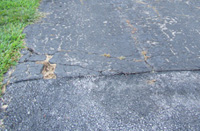Follow these Asphalt Driveway Maintenance Tips for a Long-Lasting Driveway
 Asphalt paving lasts the longest and holds up well to adverse conditions, compared with other paving options. With proper care and maintenance, an asphalt driveway can last for up to a quarter of a century before it needs to be replaced. But it is important to understand that asphalt paving is a “flexible” medium. It conforms to the shape of the surface underneath and can also give to concentrated pressure from above, especially in hot weather. Choosing an expert Manassas paving company like Gorman Paving to establish the foundation for a long-lasting driveway is the first step to success. After your driveway is in, follow these asphalt driveway maintenance tips to get the most out of your driveway:
Asphalt paving lasts the longest and holds up well to adverse conditions, compared with other paving options. With proper care and maintenance, an asphalt driveway can last for up to a quarter of a century before it needs to be replaced. But it is important to understand that asphalt paving is a “flexible” medium. It conforms to the shape of the surface underneath and can also give to concentrated pressure from above, especially in hot weather. Choosing an expert Manassas paving company like Gorman Paving to establish the foundation for a long-lasting driveway is the first step to success. After your driveway is in, follow these asphalt driveway maintenance tips to get the most out of your driveway:
Mind the Edges
- Make sure the sides of the driveway are properly supported with stone or back-filled, hard-packed dirt. A firm edge prevents the sides of the driveway from cracking or slipping.
- Maintain the landscaping around the edge of the driveway. Make sure the driveway isn’t too close to any big trees with growing roots (they can cause buckling) and that weeds, grass or other plant invaders don’t have a chance to establish themselves and damage the integrity of the driveway edges.
- Avoid driving equipment or vehicles off of the edges of the driveway as this can also cause fractures, cracking and damage. Also, do not park too close to the edge.
Watch How and What You Park
- Prevent pointed or sharp objects from being left on the driveway – both for the sake of the asphalt and your tires. Keep in mind that kickstands, jacks and jack stands can poke holes in the driveway.
- Do not sharply turn the wheels of any parked vehicle while in your driveway if at all possible. This will damage the surface coating.
- Don’t be a creature of parking habit: frequently change the spot where you park your vehicle to avoid causing ruts and indentations, especially in hotter weather.
- Be mindful of your driveway weight limit. It was built to withstand regular family vehicles, but extremely heavy equipment or very large trucks can damage the asphalt and cause it to give way.
Avoiding and Cleaning Up Spills
- Oil, gas and other solvent leaks can damage the coating and soften the asphalt itself, so repair any leaks in your vehicle promptly.
- Avoid changing your oil or filling lawn mowers, trimmers, etc. on the driveway. Of if you do, make sure to put a large slab of thick cardboard underneath the area to catch any spills.
- If you notice a gasoline or oil spill on your driveway, use kitty litter or Jiffy Dry to soak up the excess liquid, and then use a powdered laundry soap to remove any residue. Rinse with water thoroughly afterward.
Fixing Cracks, Keeping it Sealed
- Cracks can let water, oil, gas, weeds and other invaders creep in and weaken your driveway. When a crack gets to be about 1/4 inch wide, this becomes a real danger.
- Get your asphalt driveway seal coated every 2-3 years. This slows the negative effects of water, gas and oil, fills small cracks and helps your driveway last longer.
